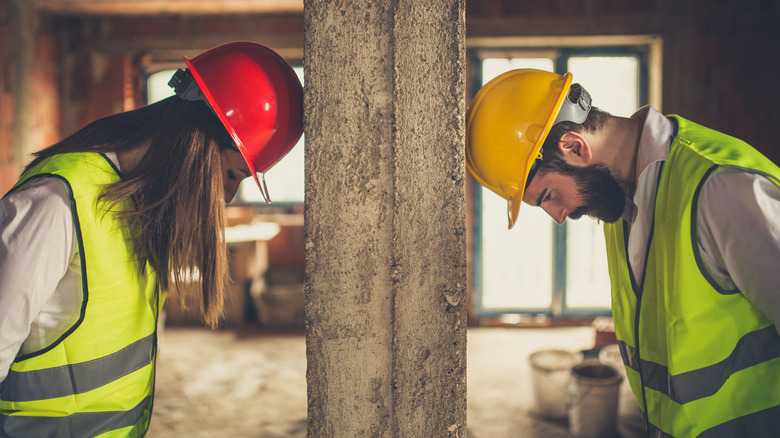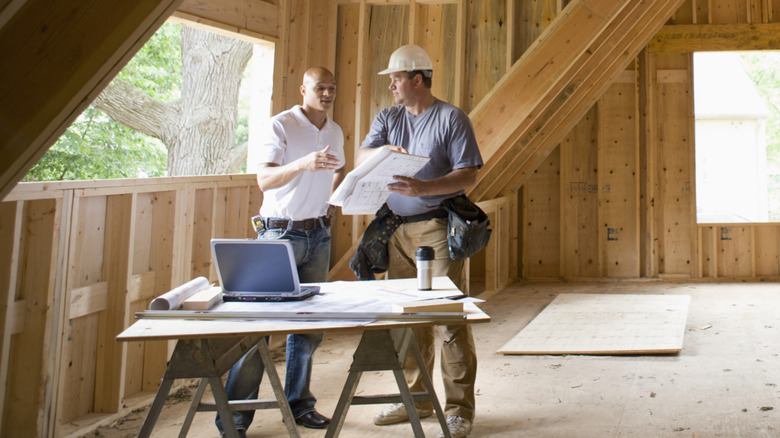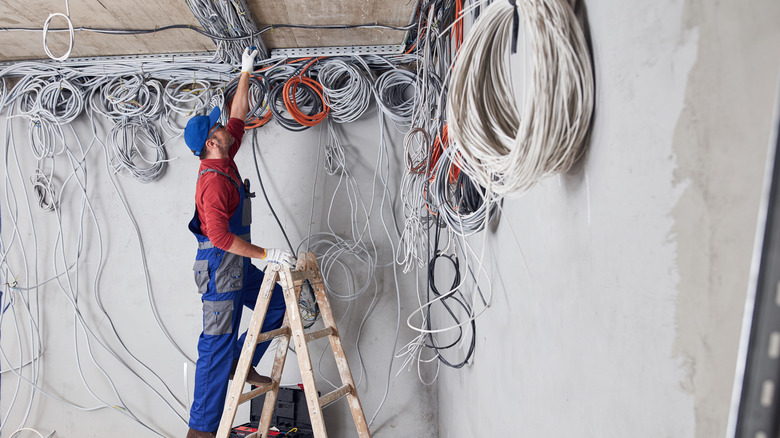Building Your Own Home? Here's Why Your Estimated Schedule Is A Joke
When you're building your own home, you're also going to have an estimated schedule. It's the theoretical structure that holds a million equally theoretical (yet all-too-real) pieces together. A long time ago, I read somewhere that building a home typically takes between seven and 14 months, and if by "building your own home," you mean that you're being a dogged and knowledgeable general contractor for your own house, I can see 14 months. With experience, maybe you get down to eight or so. But if someone is general-contracting their own home in seven months, I strongly suspect they plan to live in an ice-fishing shack... albeit a very nice one, perhaps with hot water recirculation and some kind of smart home-enabled ice auger. Meanwhile, if you're a plain old DIYer planning on literally building your home with your own two hands? Even 14 months is a pipe dream. In fact, pipes are a pipe dream, because there's a good chance you won't even get the plumbing roughed in by then.
When I set out to build my own home following a post-COVID layoff, I figured I'd get it done in nine months. That proposition now makes me laugh, between the tears. Even 14 months was out of the question for me, and probably for you, too.
It's not all about pulling building permits. Not construction change orders, either, though both of those have their roles to play. Truthfully, nothing specific — not even an unfortunate run-in with a ladder that broke my right wrist — broke our project schedule by itself. But everything gathers debris as it rolls downhill, and by the time the finish work started around day 450 of my 274-day building schedule, the schedule and remaining work were a tangle of wire remnants and splintered cutoffs.
The first problem with DIY home building schedules: You (& your contractors) have too much going on
As a father made jobless by the pandemic, there was a month or so when my daily schedule looked like waking up, complaining about something called Blippi for 18 hours, then going back to sleep. But parents' lives are never simple. Our children have schedules of their own, revolving around dentistry, injuries, education, and attempts on various fronts to drive us into poverty. They didn't promise to relent when my wife and I bought property in the country and started building a house, either.
Managing contractors meant coordinating the schedules of those tradesmen with my own — and by extension, with my children's, as well as the schedules of the concrete guy's children, for that matter. Any critical path activity performed by a contractor should probably get padded by at least 50 percent.
Contractors sometimes deprioritize small jobs (like yours) for several reasons. Bigger jobs get priority, and most of their jobs are bigger. While relationships have value, your value as a builder expires as soon as the house is done. And possibly before then. In my case, the guy pouring my foundation stood and stared at my boundary string for something like two hours before scratching his head and pronouncing, "Ain't no shape I ever heard tell of before. Lunch break" — and "Lunch break" is universal trade slang for "See you tomorrow, unless something more important comes up." All in all, unless you're somehow able to make getting this thing done your sole priority for the next however many months, every little life event is going to set your schedule back.
You also don't (yet) actually know how to build your own home - and yes, the inspectors can tell
I definitely didn't know what I was doing, and while I was learning fast, that takes time... and I was learning almost everything. Inspections generally went well, though I could tell the building inspector wasn't entirely confident in my knowledge, based on his use of phrases like "So, you're pretty new at this..." (because inspectors specialize in pointing out obvious things that we don't want to be obvious). Making changes to prior work while using new skills like plumbing and wiring — roughing-in should be slightly less rough — meant that new learning periods were scattered throughout the process, like a jar of marbles spilled on the floor. The inspector occasionally got testy and stopped saying much other than some mumbling about lost marbles. After more iterations than was seemly, I was finally able to move on to the next phase.
Learning to do something without experience, practice, or in-person instruction is a slow and frustrating process. Early on, I had the notion that future-proofing was going to be the thing that made my house special. I would run electrical wiring, network cabling, low-voltage cable, pex home-run to a manifold, and slightly illegal gray-water DWV pipes all over the place. But expecting something you're new at to work indefinitely in some future you can't predict isn't just a big no-no when building a home. No-nos are what the pros occasionally do; my errors were more like oh-nos. I now believe you can't schedule what you don't know, but if you must do it anyway, you should give yourself twice as long as you think to get the work done.
Every little thing pushes the completion date of your DIY home building further & further out
Your mileage will vary, of course. I did a lot of novel things in our house, which sounds great, but I paid for it with delays ... to say nothing of the broken wrist, or the fact that we welcomed a new kid right in the middle of finish work. But overall, let's take an overall look at how my nine-month schedule didn't land at nine months.
In broad strokes: The site prep, slab, and framing went mostly according to plan — maybe 15 percent over schedule (yes, small losses are victories in the Orwellian nightmare of homebuilding). Things really slowed down while installing windows and doors, owing to retrofitting some bargains. Same for electrical and plumbing rough-ins and fixtures, fittings, and equipment (FF&E), because of the dreaded entity known as "scope creep." Remember, just because it's your money and your stuff doesn't mean you can just approve every change that you or your spouse dreams up. Scope creep's impact meant that stuff all went around 40 percent over schedule. And carpentry was probably worse ... let's call it 50 percent over schedule, attributable to inexperience. Internal finishes? Well, that gets another day behind every day.
My family moved in at about the 24-month mark. Now, every deferred task is buried under layers of trim, new commitments, and LEGO bricks. So, actually being completely "finished" someday? That looks less likely all the time. Would I do it again? Sure, except for the hospital part — and only if I were younger. A young man has forever to do things, or so he thinks, and trust me when I say that building your home truly will take forever. Good luck.



